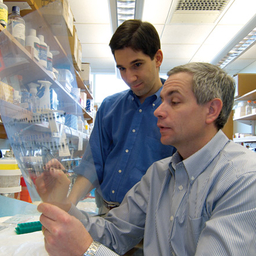Abnormal Gene Is a Triple Threat in Driving Pediatric Brain Tumors
Feb 1, 2016
A CHOP oncologist co-led an international study showing that an abnormal fused gene drives children’s brain tumors by using three different biological mechanisms.
Your child will be cared for by one of the most accomplished teams of childhood cancer experts in the world. We provide medical care, emotional counseling and much more. We make sure your child, you and every family member get the highest level of support.
Feb 1, 2016
A CHOP oncologist co-led an international study showing that an abnormal fused gene drives children’s brain tumors by using three different biological mechanisms.
Jan 27, 2016
After children with leukemia receive chemotherapy, are they better off remaining in the hospital, or going home? CHOP is leading a multicenter study of both safety and family preferences.
Jan 26, 2016
CHOP’s new Center for Data Driven Discovery in Biomedicine aims to harness and broadly share biomedical information to more quickly benefit child patients.
Jan 7, 2016
CHOP researchers have identified a powerful new drug with “unparalleled” strength against refractory types of neuroblastoma.
Dec 10, 2015
A $1.5 million grant to CHOP from Alex’s Lemonade Stand Foundation supports an innovative treatment for children with high-risk neuroblastoma.
Nov 18, 2015
CHOP’s Dr. John Maris comments on a just-published major study of genes that raise a child’s risk for cancer, and what this means for counseling families and patients.
Nov 11, 2015
CHOP pediatric oncology researchers have pinpointed a crucial change in a single DNA “letter” that predisposes children to an aggressive form of neuroblastoma.
Oct 13, 2015
The Four Seasons Parkway Run & Walk raised over $1 million and proceeds support research and survivorship programs at CHOP’s Cancer Center.

Sep 10, 2015
Building on its decades-long investigations in the biology and treatment of neuroblastoma, CHOP will lead the consortium’s neuroblastoma research program.

Jun 29, 2015
CHOP neuroblastoma researchers have detailed how cancer-driving mutations evolve during chemotherapy, and they aim to exploit this knowledge to design better treatments for children.